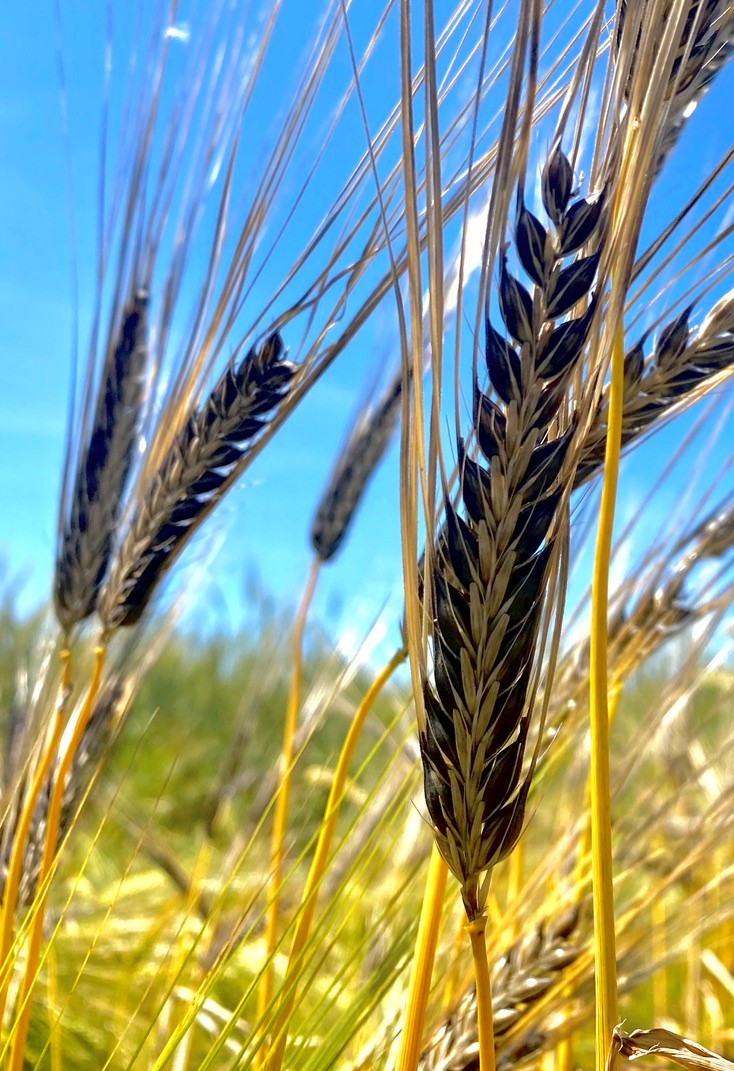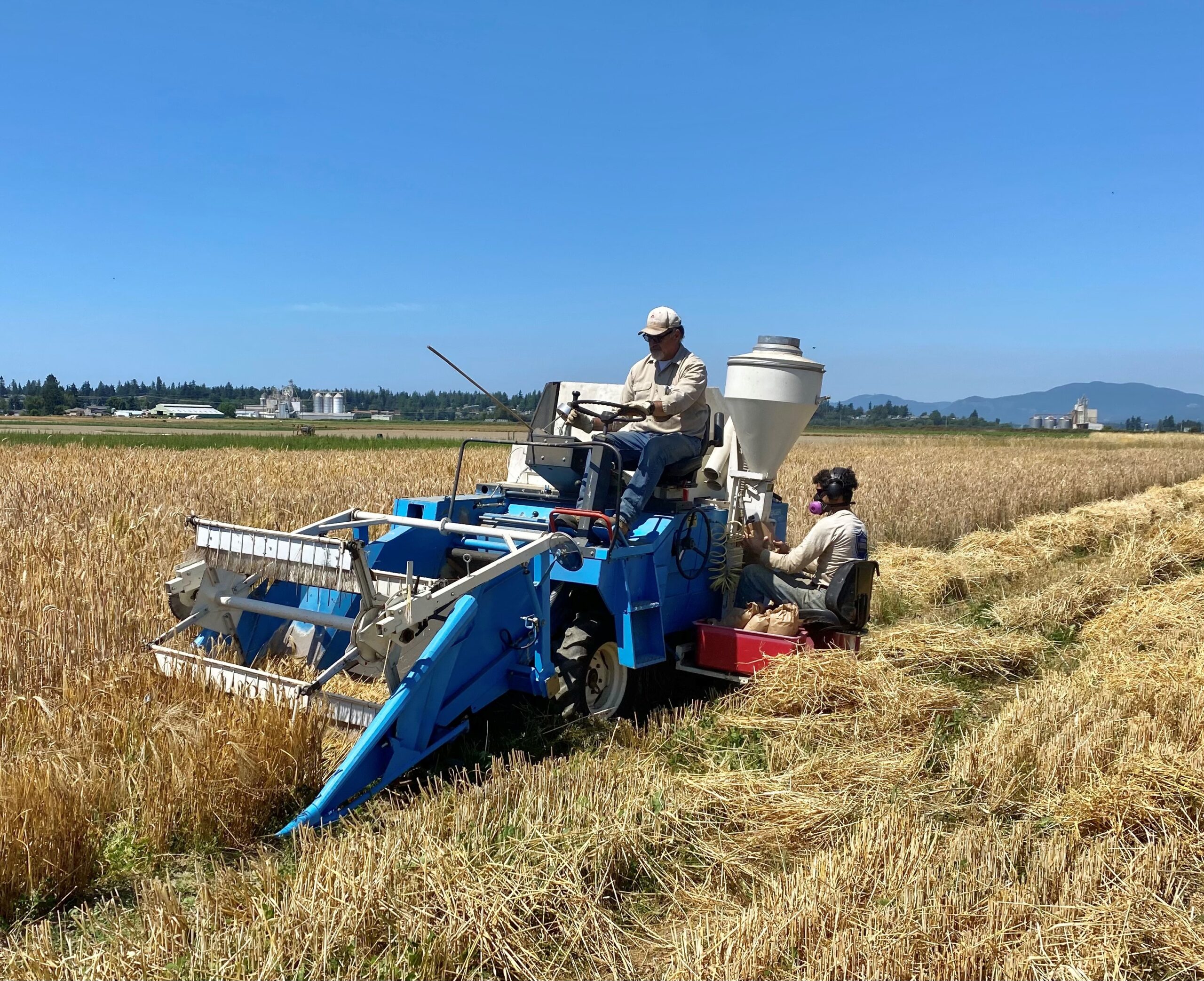By AnneMarie Hunter

Not so long ago, a trailblazing Seattle distiller was in search of the perfect barley to flavor his new American single malt whiskey.
Little did he know this special grain was already growing in a beautiful valley not so far away.
In a serendipitous moment in 2012, this distiller, Matt Hofmann, met Dr. Stephen Jones, pioneering grain scientist and Breadlab founder.
“The serendipity in that meeting was amazing and opened possibilities with the Breadlab that were staggering to comprehend,” said Hofmann, who met Jones at the lab’s annual Grain Gathering. There he also discovered that Jones and his team had been developing the barley he was searching for.
Jones founded the WSU Breadlab in 2011. Located in Skagit Valley, the Breadlab researches, develops, and advocates for grain varieties that are healthful and delicious for people, good for the land, and profitable for farmers.
In 2013, Westland Distillery bottled its first whiskey. Founded by Hofmann, Westland is forging new whiskey traditions with a focus on flavor and an ethos rooted in environmental and economic sustainability.
From that first meeting, a collaboration between the Breadlab and Westland Distillery was born. Together, they share a commitment to innovative grain research, production, and agricultural practices for Westland’s whiskey barley and beyond.
“Westland’s philosophy is about seeking new possibilities for whiskey through regional agriculture and flavor,” Hofmann said. “Up until meeting the Breadlab team, we were searching for options and didn’t know they already existed. We did know current solutions were insufficient for what we were trying to accomplish–which was finding flavorful barley varieties grown in a sustainable, organic way.”
Pioneering Grain Research

“We lead the world in bringing flavor to whiskey that comes from the barley,” said Jones, who holds a PhD in molecular cytogenetics and is WSU’s Clif Bar and King Arthur Flour Endowed Chair in Organic Grain Breeding and Innovation.
“Until recently, most people thought whiskey flavor came exclusively from the barrel. That was true because barley malt was all the same with no flavor differences. There’s a strategy to create differences in barley flavor and that’s where colorful grains come in. They bring nuance and flavor to the whiskey.”
Colorful grains are at the heart of the Breadlab’s research.
“Colorful grains distinguish our work at the Breadlab, and on the farms we work with,” Jones said. “The sources of these colors are from areas as diverse as Scandinavia, Ethiopia, and Tibet.”
Hofmann’s first introduction to colorful barley was at the lab.
“The Breadlab has advanced a new way to look at ingredients, including colorful grains,” Hofmann said. “I went through formal whiskey education in Scotland and never learned barley could be blue, red, or purple.”
Diverse grain color offers far-reaching benefits, in addition to enhanced flavor. Ideal for cooking, baking, and distilling, these nutritionally dense grains feature antioxidant flavonoids that can help prevent the development of cardiovascular disease, diabetes, and cognitive diseases like Alzheimer’s.
The colorful lines of wheat, barley, buckwheat, and other grains developed by the Breadlab are also environmentally beneficial. Since World War II, North American grains have been developed to be sprayed with chemicals. The Breadlab’s breeds thrive without chemicals–and no GMOs are involved in grain pollination and cross breeding.
“Our seeds are farmed in a regenerative manner, where they build the soil rather than degrade it,” Jones said. “The seed diversity, along with organic methods for farming and harvesting, is a climate friendly approach and increases yield.”
There’s also the aesthetic.
“The flavor is what we’re going for in distilled spirits and baked products both,” Jones said. “But we embrace the beauty of what we do, as well. We ascribe a nonmonetary, but very human value to the grains’ beauty.”
Pioneering Whiskey Traditions

For centuries, the flavor of single malt whiskey has been primarily derived from the barrel, not the grain.
“That’s a choice and it doesn’t have to be that way,” Hofmann said. “At Westland, we’ve deliberately chosen flavorful barley evocative of our region. When we look at the wine, beer, and fine dining industries, their focus is on where raw ingredients are grown and sourced. Whiskey never jumped over to this thinking.”
To amplify their exploration of flavor-based whiskey distilling, Westland created and funded a $200,000 PhD fellowship at the Breadlab in 2020. This fellowship supports colored barley research for malting purposes, with an emphasis on varieties intended for organic agriculture.
This fellowship is impactful for the Breadlab, as funding has presented ongoing challenges to the group’s goals since its founding.
“Westland Distillery’s funding allowed us to add the fellowship to our program and expand our barley breeding program to work on varieties with unique colors that don’t exist anywhere else,” said Kim Binczewski, the Breadlab’s managing director.
Beyond the funding, working with Westland has also influenced the Breadlab’s own direction and vision for their research and development.
“We’re partners with Westland and they’re our friends,” Jones said. “They’ve also shown us that unique barleys aren’t just possible, but necessary for one industry to move things forward in novel, meaningful ways.”
The Commodity Market and Redefining the Future
This novel, meaningful direction is revolutionary in today’s commodity market system. In this system, under which the majority of our nation’s agriculture operates, novel color in grains is not allowed.
“Everything in the commodity market is pre-defined and doesn’t allow for diversity,” Jones said. “Barley for malt has to be blonde or tan, wheat has to be red or white, and so on. The system also doesn’t allow for variation of crops that are climate and environmentally friendly.”
Jones and his team have worked for more than a decade to redefine this deep-rooted construct by providing a paradigm shift in agricultural practices.
“The Breadlab has created a model for regional grain systems and climate-conscious plant breeding that is now being replicated across the United States and world,” said Janine Johnson, Breadlab’s special projects lead.
Hofmann agrees.
“When you think of changing an entire agricultural system, Breadlab is playing a huge role,” he said. “We’ve used 20 different barley varieties at Westland, more than the entire Scottish whiskey industry all together, and it’s because we went off the approved commodity list.”

Building Relationships
In the process of creating a model for regional grain systems, the Breadlab is also rewiring the perception of relationships between researchers, farmers, producers, and consumers.
“The Breadlab has shown us another way of interacting,” Hofmann said. “The commodity grain system is not about relationships. It’s about detachment and actually separates stakeholders in the chain. The grain in the elevator is mixed with other farmers’ grain, it’s then sent then to the malter, then the distillery, so there’s no connection. The Breadlab offers an inverse to that, and they’ve shown us a new collaborative process.”
Hofmann has seen the results of that collaboration firsthand.
“We worked with a farmer who grew some of our barley and gave him a bottle of whiskey that had his barley in it. The look on his face was pure joy and his pride was amazing. This connection with each other has huge implications beyond the flavor of the liquor in our bottles.”
Research opportunities like this are created by the generous support of corporate and individual President’s Associates of Washington State University” or something of the like in the story and at the end add a phrase like “ If you would like to support this research, please visit the Breadlab General Fund or the Westland Distillery Fellowship.
Thank you again, and GO COUGS!
Free Seeds for Your School
Imagine growing unique, colorful wheat with your students.
Thanks to WSU Breadlab’s outreach efforts, teachers and students can share the experience of planting and nurturing wheat seeds developed by the Breadlab.
Educators who would like to participate in the Seeds to Schools program can contact the Breadlab’s managing director, Kim Binczewski at kim.binczewski@wsu.edu.
